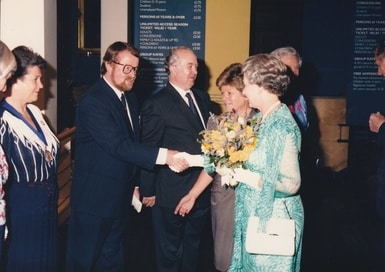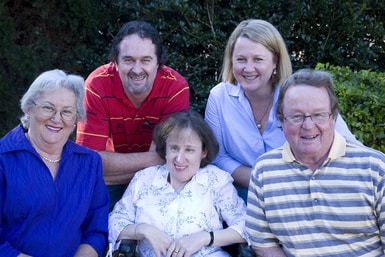Passion for people was Brian’s life
Brian Davey, who passed away suddenly on 6 August this year, was an integral part of guiding the APA to become a truly national body, among many of his listed achievements. Those close to Brian remember him as a gifted leader, a skilled negotiator, a meticulous researcher, a devoted family man and someone who enjoyed a drop of good red wine.
There were many aspects of his career as a physiotherapist, successful private practice owner, advocate, and executive office bearer in professional bodies in Australia and overseas that made Brian Davey proud. Seeking the limelight and counting accolades, though, was not in Brian’s nature. As a leader of the profession, Brian was often thrust into prominence, driven to champion the cause for change that he and other like-minded peers felt necessary for the profession’s growth. At home, Brian was a jovial man, a doting father to his three children, Greg, Susan and Fiona, and a devoted husband to his wife, Joyce.
Brian’s emergence as a leader of the profession in Australia came at a crucial time in physiotherapy history—it was during the mid-1970s and early 1980s, and the APA was a federated group in the process of becoming a cohesive national body. Physiotherapy schools at universities around the country were sending their first cohorts of postgraduates out into the workforce, and advocacy was underway with the medical fraternity to have physiotherapists become first contact practitioners.
Brian’s natural affinity for people and his substantive management and negotiating skills became evident during this time and, coupled with his role as the then-APA New South Wales branch president (1979–80), Brian began to forge links with other leaders to bring about real change. With the support of other state presidents, Brian did some of the principal work on changing the APA from a federated group to a national association. He was heavily involved in the negotiations around that change and would go on to become APA President in 1980–81. His successor as APA president, Lance Twomey (1982 84), says Brian was a ‘first class leader’, someone who challenged the status quo but who looked for consensus rather than opposition.

As WCPT president Brian met with Queen Elizabeth as part of the 1991 WCPT Congress in London.
‘Brian was also a good leader in that he did his homework, which is always important. He injected humour into a good deal of what he had to say and that helped him keep people on side and keep the whole negotiations flowing,’ Lance says. ‘The striking thing about Brian was his good humour, his smile, his ability to take on difficult tasks and he was a terrific fella who was the right person in the right place at the right time.’
Brian was born and raised in New Zealand, trained to become a physiotherapist in Dunedin and graduated in 1961. The keen rugby union player met Joyce, then a nursing sister, in a public hospital in New Plymouth where they both worked. The couple wed and ran a private practice together in Masterton before having their three children, the youngest of which, Fiona, has spina bifida.
The young family migrated to Australia in the early 1970s, largely for the increased availability of medical treatment for Fiona, and Brian began working with a fellow physiotherapist, Brian O’Gorman, in Sydney. Brian’s brother Denis, also a physiotherapist, crossed the ditch and the brothers opened the first of many successful private practice clinics around Sydney.
Brian became interested in a more hands-on role in the APA and joined the New South Wales branch after identifying what he saw as constraints in growth of the profession. He began advocating for the APA state branches to unite and form a national body to facilitate more effective and persuasive lobbying of the federal government for funding. He was also an integral part of the discussions with the Australian Medical Association, first in New South Wales and then in other states, to allow physiotherapists to become first contact practitioners.
In a series of interviews he did to mark the centenary celebrations for New Zealand physiotherapists in 2013, Brian says that during his time in executive roles with the APA he also helped work on setting up a program of ongoing education for physiotherapists which, at the time, took the form of a series of lectures run on weeknights and on weekends for little or no fee. This concept developed to become the continuing professional development (CPD) program that it is today.
Brian shifted his focus from national to international when he was appointed as a member of the executive committee for the Western Pacific Region of the World Confederation for Physical Therapy (WCPT) in 1982, then became the WCPT president from 1988–91. His influence extended to overseeing a process to enable stronger member organisations to support those with the least resources and which were geographically close by.
A passion for physiotherapy runs strongly in the Davey family, and Brian’s eldest daughter, Susan Davey, remembers her father taking her on house calls with patients when she was a young child. ‘Physio was never just a job for him,’ Susan says. Even after he retired in 2005, Brian never stopped being interested in people, says Susan. Susan, who followed in her father’s footsteps to become a physiotherapist and presently works with her uncle Denis, says her father was the type of man who would be out walking the dog and would greet his neighbours by name and know their stories.

Family man: Brian Davey (far right) was a loving husband to his wife Joyce (far left) and children
Greg, Fiona and Susan.
‘He was happy and very kind, and interested in everybody. He was a real people person, people gravitated to him,’ Susan says. ‘He was always wanting to help people, even though he was so long retired he was always “if you need help with this, contact this person”. He never stopped being interested in people and their wellbeing. He was a beautiful all-round person‘He was also really proud of being on the WCPT and getting some recognition or acknowledgement of the needs of third world countries, and encouraging and supporting programs and works for that. Some of the things he did in Australia, too, he was pretty proud of, getting some cohesiveness and a real professionalism with regards to management, through boards and things like that. We were all very proud of Dad being awarded an OAM for services to physiotherapy in 1992,’ Susan says.
A funeral service was held on 15 August in Ballina, in northern New South Wales, where the family had moved to from Sydney in 2005. Two months before his passing, Brian and Joyce had moved to nearby Hope Island and they were due to celebrate their 56th wedding anniversary next month.
© Copyright 2024 by Australian Physiotherapy Association. All rights reserved.





